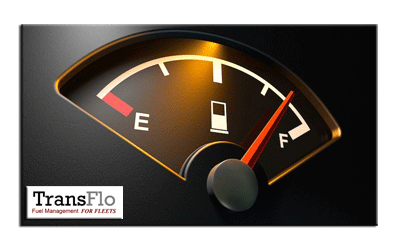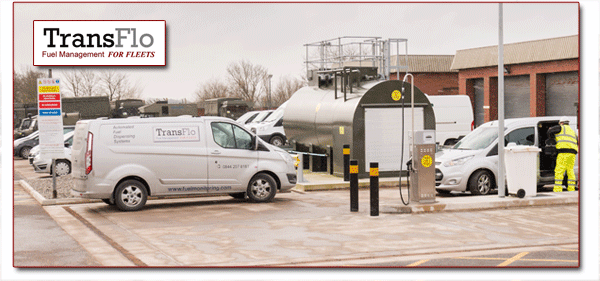Most organisations pay great and detailed attention to how they use Fuel in whatever form, to support their operational models. With increasing fuel prices, a vast number of Fleet and Transport organisations as well as a whole host of other organisations, procure and store their own fuel. This allows for more timely fuel purchasing and the benefits of being able to purchase fuel in anticipation of pending rises.

Of course, you and your business can benefit hugely from this but there some other very simple measure that you can think about and potentially employ within your organisation that will offer some tangible benefits to how you operate along with the costs that go with that.
At TransFlo, we believe that there are a number of Key Considerations that benefit organisations when looking at how fuel is used to support your business. Both cost and ethical issues are at play and need to be considered, resulting in well thought through and safe working environments for employees, whilst reducing your environmental footprint and actually saving you money through best practice. Some of these issues sit well outside the realms of Fuel Management Systems, however, they can be quickly employed and return tangible, measurable benefits.
Fuel Consumption and Cost Benefit
Environmental Impact
Fleet/Vehicle and Driver Safety
When it comes to improving the efficiency of your vehicles and fleet, there are a number of things that can be done. Some organisations will be employing some of these measures and no doubt some organisations will pay little or no attention to these measures but in general, the measures below can be implemented quickly and with low overhead and produce a great and advantageous return
Most people who drive, either as part of their work, or simply in general, will have items in their vehicle that they realistically don't need for the work or journey that they are undertaking. Often bulky items will reside unnecessarily in the boot or in container compartments etc. Removing these unneeded items and ensuring you have just what you need for your given journey can greatly reduce your fuel consumption. Clearly the reduction of real MPG will be based on the amount of excess weight that you are carrying but it is an undisputed fact that additional weight will increase the amount of fuel you need to complete any given journey. In some cases, this may simply be a nominal amount but over a year, or 50'000 miles or perhaps even over the life-time of your vehicle, there are benefits to be had. This will assist in reducing your operational costs in the long run.
Keeping your fleet or individual vehicles regularly serviced and maintained has a range of benefits, not only relating to costs but also the safety of your vehicle. In addition to planned servicing, drivers can benefit from timely data regarding the status of consumption increasing factors. Here at TransFlo we go a long way to provide Added-Value to out client base in an attempt to assist in the reduction of operational costs and whole life costing.
TPMS or Tyre Pressure Monitoring System is a technology that TransFlo utilise in some of our Fuel Management Systems. When driver/operators draw fuel from our systems that employ TPMS, they are presented with the live tyre pressure of all tyres on the vehicle and given on-screen advice should they be below safe operating parameters. It is widely considered in the Automotive Industry that Tyre Pressures are a main cause of the degradation of vehicle efficiency. On average, unless checked and remedied, vehicle tyres will lose around 2-3 Psi per month. Not a big deal in itself but if left unchecked, the accumulated effect can and will increase the fuel consumption of any given vehicle. As an example, the loss of just 1 Bar of tyre pressure will increase fuel consumption to the tune of 6%. Put another way, if not monitored, you can very easily find that your vehicle is returning 6% less miles per gallon. Expand that further for organisations that have 200-300 operational vehicles and the impact on fuel costs is significant

Its is good and often common practice for drivers to be checking this on a daily basis and before undertaking daily operational tasks. In addition, organisations can document this via policy instruction and refresh training. What we find and what led us to integrate this functionality into our systems is that on occasion, drivers may simply conduct a visual inspection of this element of their daily checks etc and its extremely difficult to assess correct operating pressures with the eye alone. The example above assesses a full 1 Bar under inflated tyre but in reality it may be less and virtually impossible to check with the human eye. Whilst less drastically under inflated tyres will have less impact on MPG it is clear, through evidence based research that any under inflated tyre prevents an otherwise avoidable degradation of efficiency for your vehicle.
Not only do correctly maintained tyres offer consumption benefits but they also ensure the longevity of your tyres. Low pressures will affect the side-walls, causing decay and also mis-formed tread wear meaning early replacement. Tyre Pressure also impacts safety and environmental impact as you will see below.
Taking the time before any journey to work out a preferred route, start time and return time are some simple steps that can be taken to ensure greater operational efficiency. It may be the case that your route is supplied for you as part of your working routine but a quick analysis of your given route could reveal potential black spots or congestion that you can then plan around. There are a number of intelligent websites that will give you live traffic data which will help. There is also a need for management teams to understand this measure as it can and will prove more efficient in some cases for drivers to sit in the canteen drinking coffee for an hour in the morning if that means avoiding the rush-hour traffic. There are also secondary benefits to be gained here regarding Environmental Impact but we will discuss that in detail below.
It is already the case that any driver, who, as part of their job or for leisure, use roads within the United Kingdom are required to undertake training and ultimately pass a well designed and challenging test. For the most part, such tests focus on measuring the students ability to drive safely and within the constraints of British Law. The test does not realistically test your driving efficiency in a way that would benefit your organisation. Again there are some simple steps that can be relayed to your drivers, either through organisational policy documentation or through scheduled and regular refresher training. Such things as, The use of Air Conditioning during winter and Spring seasons, Changing gear more economically and maintaining a low but efficient RPM, Reading the road ahead and pre-empting road conditions and of course, operating within UK speed limits
There has been a huge focus on Environmental Impact in recent years and some imaginative and effective processes introduced into almost every business sector, not just Automotive/Transport/Fleet Management, with the aim of reducing organisational foot prints and helping deliver a safer, less polluted world for the generations to come. Our industry is considered a huge contributor to increased emissions but that is due to the nature of what we do. Transportation of goods and services around the UK, Europe and the rest of the world all contribute to the rise in pollution but there are again some simple steps that organisations can take to ensure they are operating in a more environmentally friendly way. Just recapping on the TPMS above, we can conclude that maintaining efficient vehicles that return higher MPG are, in fact, producing less Co2 per journey.
Manufacturers are producing ever more efficient vehicles and even electric variants for smaller vehicles. The driving habits of your driver/operators can also be considered as significant and ultimately assist in reducing your environmental foot print as an organisation. Ensuring engines are off during non required times such as during deliveries and preventing extended idling not only reduce Co2 output but also save money, so this is a win for everybody. Air Conditioning in vehicles as well as on-board electrical equipment all increase fuel consumption and are best used only when necessary. As an example, if your vehicle is equipped with Satellite Navigation, consider if you actually need it running for every journey. Perhaps you have a common or frequent route and know where you are going and how to get there without the need for directions. There is, in addition, a concept known as "Gentle Driving" which refers to driving smoothly as part of common practice and attempt to avoid erratic or surge driving actions.
The safety of employees, your vehicles or fleet and the safety of others is not only a legal requirement but also in the simplest terms, right and proper. When you consider the sheer magnitude of some of the vehicles operating safely on the roads of the UK and add to that, some enormous payloads of logistic based products, including fuel tankers etc, its not difficult to see the potential for serious issues and the need for safety consideration. It is a great testament to the drivers that operate on our roads and the organisations that manage them that there are only minimal reported accidents or injuries. We are aware at TransFlo, that the automotive and fleet industry takes safety extremely seriously and maintain effective and detailed policies and training for employees.
With that said, accidents can and do happen and whilst some are entirely unavoidable, it's worth considering other things that can assist or minimise the likelihood of such problems.
TransFlo work closely with HM Armed Forces throughout the world and a range of Emergency Services Organisations, delivering class-leading Fuel Management Systems and Support Services. As part of the support we give, we offer additional advice on some of the simple steps that can be taken to maintain efficiencies, including a number of measures that can be adopted to ensure ongoing safety of employees etc as well as take some great tips on how to prevent or avoid the inevitable. It should be noted that these employees are some of the best trained drivers in the world and who are operating in some of the most challenging environments where the stakes are higher than perhaps for many of us and so great steps are taken to reduce risk and remain operational.
As mentioned further up this page, maintaining correct tyre pressure for your vehicles not only saves you money, reduces your environmental footprint but also greatly assists in driver/vehicle safety in a number of ways. Your tyres, as we know, are the single point of contact between your vehicle and the road. Maintaining, replacing and inspecting these regularly, hugely reduces the risk of accident or worse. Braking, Aquaplaning and Vehicle Stability are all affected by the pressure in your tyres. Are you aware that a drop of 15 Psi in a vehicles tyres will extend your safe braking distance by 5m ? Equally, road holding is drastically affected and under inflated tyres can greatly reduce the overall capability of your vehicle when it comes to cornering. Again, as an example, if a bend can safely be rounded at 62 mph, its absolute maximum safe speed if tyres were under inflated would be 54 mph. Thats ok if its a known scenario but often it isn't.
